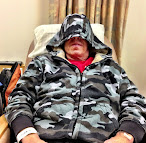I was introduced to the idea of meditation for restoring life balance, mental health and a wide range of personal benefits. But sadly, the concept never took flight with me- as I could never get to that state of effect- turning my my failed attempts into a frustrating brick wall.
Then one day, I met an unassuming Dave Dachinger during the launch of my online NYCRA group (NY Cancer Resource Alliance) around 2018- who successfully changed my entire perspective on what is apparently a centuries old medicine. Mr. Dachinger is a retired firefighter and cancer survivor- with a body of knowledge that fit our cancer advocacy membership perfectly. But what caught my attention about him was inventing an APP called LOVING MEDITATIONS for cancer patients undergoing the physically taxing discomfort of infusion therapy (infusion therapy or chemo trickle).
 |
| Dave receiving infusion therapy (2014) |
With a little kickstarter funding and a lot of entrepreneurial spirit, Loving Meditations was launched, earning significant international following in many circles including the functional health and wellness markets. Meanwhile, Dave's digital harnessing of the fruits of meditation became a major reference of how brain health and stress reduction could both help the end road of any therapy.
EXCERPT FROM "LIVE CALM WITH CANCER (…AND BEYOND)" By: Tamara Green, LCSW & David Dachinger
DECISIVE
DOCTOR VISIT
About a year after my initial
diagnosis of stage IV head and neck cancer, I had a follow-up visit with my
oncologist "Dr. C." After my vitals were taken and blood drawn, we had a brief
wait in the bleak exam room.
During this exam, Dr. C. announced
that my scans were clear and I was now officially cancer-free. He commented, “That was not an easy regimen (chemo,
radiation and surgery) you just had, but you did phenomenally well!” He asked
if there was actually something I did which helped me get through treatment in
such good emotional and physical shape. I replied that I’d used a mindful wellness practice,
listening to programs at the infusion center. His eyes lit up as he suddenly
proclaimed, “That’s what I want for all of my patients!”
He desired a way his patients could become calm before their exams or
treatments.
As Dr. C. talked, Tamara’s eyes and mine met and a light bulb lit up. We’d been creating the Miracle Mondays guided meditation series for seven years, and we’d also recently lived through the cancer experience as patient and caregiver. Now my oncologist was pointing out a pain-point within his practice. As we exchanged huge smiles, we had our a-ha! moment: Loving Meditations was born.
RESEARCH-BASED RESULTS
Meditation has deep roots in research-based results. CancerNetwork.com, home of the journal Oncology, reported that mind-body practices like mindfulness meditation have been shown to “positively affect quality of life and biological outcomes” when used by cancer patients and healthcare professionals. [1] Let’s face it. Cancer and other major illnesses are scary, overwhelming, and stressful. How can we handle them with more ease?
[1] CancerNetwork.com, home of the
journal Oncology “Mindfulness Meditation” by Susan
Bauer-Wu, PhD, RN Oct 19, 2010
http://www.cancernetwork.com/oncology-nursing/mindfulness-meditation
As you watch Loving Meditations, Tamara’s calming voice, David’s expansive music and spectacular images shift you to a state of more calm. Our mindful techniques worked beautifully for us and also have helped thousands of people in over twenty countries.
RECHARGING FOR CAREGIVERS By: Dr. Leslie Valle & the Prevention101 Editorial Team  During the Covid-19 surge, interviews with emergency medical professionals showed dramatic cases of ICU and ER responders exposed to major signs of advanced fatigue and risk of burnout. This significantly raised major risks to their work performance where lives are to be affected, including theirs. Over time, double and triple shifts resulted in "a different type of pandemic" on a national scale- where this level of exhaustion and overwhelm. During the Covid-19 surge, interviews with emergency medical professionals showed dramatic cases of ICU and ER responders exposed to major signs of advanced fatigue and risk of burnout. This significantly raised major risks to their work performance where lives are to be affected, including theirs. Over time, double and triple shifts resulted in "a different type of pandemic" on a national scale- where this level of exhaustion and overwhelm. Where a leave of absence, a vacation or regular rest is not an immediate option, we can start with addressing BRAIN HEALTH AND MENTAL HEALTH. Modern meditation solutions (like BrainTap®, Loving Meditations® and other such technologies) are now available for exactly this emergent case as a portable personal "Rescue" dose. By tap ping the mind/body connection into a Vital Re-charge mode, we can induce a "Refresh- Revitalize-Renew" condition. As with conventional meditation, bringing you into a regenerative meditative state offers that level of rest, clears the mind for renewed focus and new energy to continue with the 'battle' at hand. |
WHAT, ME MEDITATE? We’ve heard folks say, “Yeah, but I have no time to meditate!” Looking at it another way, we don’t realize how many hours we actually spend watching the news, TV programs, or digital content on social media. Many of us devote significant time to this, sometimes to the point of addiction. Another common problem people mention about starting a mindful practice is that they can’t stop thinking and their mind is too “active” to meditate. They may have tried meditating in the past and found it difficult to sit and do nothing. Barraged by thoughts, they can’t shut them out. What if it was as easy as putting in earbuds and pressing play on the Loving Meditations App?
What self-care solutions are available to reduce this harmful distress? Several easy and simple mindfulness meditation techniques can help. You can even do some standing in a checkout line, awaiting the doctor or while sitting in traffic. Along with yoga and repetitive prayer, mindful practices are known to evoke the “relaxation response”, which is the counterpart to the stress response. Meditators enjoy greater emotional clarity and mental resilience, and meditation can actually increase the amount of gray matter in your brain (which is a good thing!)
What is MODERN MEDITATION? In today’s relentless hyper-speed world of soundbites and snapchats, traditional practices like sitting and meditating for an hour in a quiet room are no longer practical. Modern Meditation reaches more people by adapting traditional meditation techniques to suit the needs and lifestyles of people today.
 SCIENCE BACKED RESULTS: Researchers from Johns Hopkins
University examined almost 19,000 meditation studies and found 47 trials on stress
and anxiety which they deemed well-designed studies.1 The results of this
meta-study were published in The Journal of the American Medical Association’s
Internal Medicine, and suggest that mindful meditation brings calming benefits
to psychological stresses like depression, anxiety, and pain. Meditation has
been demonstrated to reduce insomnia and help lower blood pressure. The
benefits of the relaxation response have also been shown to increase
mitochondrial resiliency, which may reduce vulnerability to disease.2
SCIENCE BACKED RESULTS: Researchers from Johns Hopkins
University examined almost 19,000 meditation studies and found 47 trials on stress
and anxiety which they deemed well-designed studies.1 The results of this
meta-study were published in The Journal of the American Medical Association’s
Internal Medicine, and suggest that mindful meditation brings calming benefits
to psychological stresses like depression, anxiety, and pain. Meditation has
been demonstrated to reduce insomnia and help lower blood pressure. The
benefits of the relaxation response have also been shown to increase
mitochondrial resiliency, which may reduce vulnerability to disease.2
In another study at the University of Maryland, 63 rheumatoid arthritis (RA) patients used mindfulness meditation.3 They reported a 35% reduction in psychological distress and increased sense of well-being after an eight week period of mindfulness.
In the field of psychoneuroimmunology (the study of how the mind affects health and the body’s resistance to disease), research is showing that thoughts influence the immune system, and stress makes you sick.4 If that’s compelling enough to motivate you, why not launch a new healthy habit of mindfulness and meditation?
EAST MEETS WEST:
A variety of meditation apps make it easy, by blending user-friendly technology with meditation techniques. They feature deep breathing or guided imagery to help relax your mind. Using an app for mindfulness makes the process simple, is completely portable and keeps you on track with your practice. One app company, Headspace, is now seeking FDA approval as the first prescription meditation app with clinically validated meditation programs. Its rollout date is 2020.
GET ADDICTED TO THE HEALTHY MED!
1.
https://www.health.harvard.edu/blog/mindfulness-meditation-may-ease-anxiety-mental-stress-201401086967
2.
http://journals.plos.org/plosone/article?id=10.1371/journal.pone.0062817
3. https://www.ncbi.nlm.nih.gov/pubmed/17907231
4.
http://www.apa.org/monitor/dec01/anewtake.aspx
5.
https://www.drweil.com/videos-features/videos/the-4-7-8-breath-health-benefits-demonstration/
6.
http://www.diy-stress-relief.com/equal-breath.html
7. https://cmbm.org/blog/mind-body-medicine/soft-belly-breathing/
















